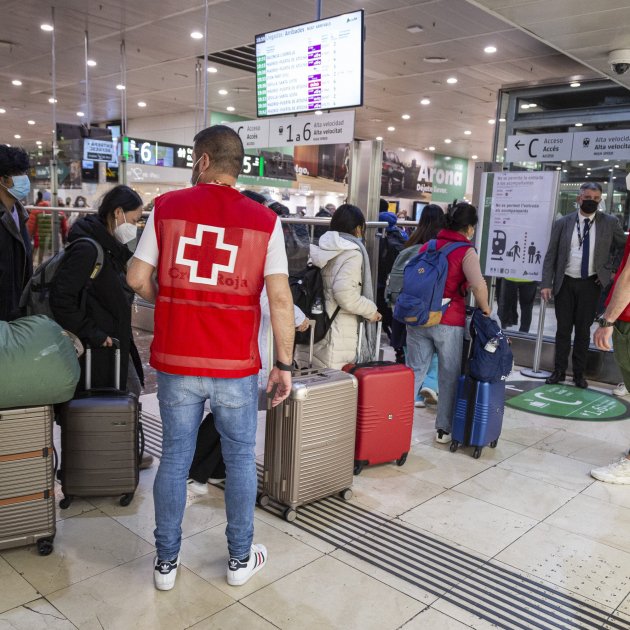The Spanish social security and migration minister, José Luis Escrivá, gave the news last Monday that one of Barcelona's trade fair buildings was being readied to host the major centre for reception of Ukrainian refugees in Catalonia. As he anounced, the plan is for this centre, at the Palau Victoria Eugenia, near Plaça Espànya, to function as a large Red Cross operations centre, where refugees would be given initial help, orientation, and a place to spend the first few nights until being sent to a permanent location. The day chosen for the opening was this Friday, March 18th at 9 am. However, uncertainty reigned at the doors of the centre in its first few hours.
There were people queuing to enter the building from before first light, and once the doors opened, confusion spread, as it was announced that only those who had made a prior appointment could be helped, which took many of those waiting by surprise and caused some to leave the queue. However, one key exception was also announced: those Ukrainians who have no place to sleep are considered emergencies and are being attended without having made a prior appointment. Some of those who could not be seen today explained that they had tried to call the Madrid telephone number provided for making an appointment - cita previa in Spanish - but there was no answer. The problematic phone line was: +34 91 047 44 44.
For her part, the Catalan minister for equality and feminism, Tània Verge, who is in charge of the reception of migrants, explained this Friday in an interview with Catalan public television that, in addition to the trade fair centre, it was also intended that provincial police stations of the Spanish National Police would be equipped to receive refugees, and the opening of more centres for initial reception of Ukranians is being considered, to avoid the need for everyone to travel to the Catalan capital. She also noted that the Catalan government has created a website, also available in Ukrainian, to provide information to all those who want to help refugees. Verge criticized the Spanish government for having a "very centralized approach" to reception. In reality, she said, this reception must take place on the ground, although the initial processing of asylum and refugee documentation must be carried out through the Spanish government. She said that the emergency accommodation being provided in hotels must become more stable, and this has to be done in collaboration with town councils.
What help will the refugee centre provide?
At the refugee centre, there are Spanish police officers and Red Cross staff who are working to attend to Ukrainians who need help, both those who have arrived as refugees since the conflict began and those who were already in Spain when the Russian invasion began. To this end, the bureaucratic steps have been simplified and so-called "temporary protection" can be obtained in less than 24 hours. This protection consists of a residence permit, work permit and access to all social rights, such as health care or schooling. In addition, refugees have the right to legal, psychosocial and employment advice, access to financial assistance and language learning. As well, Ukrainians attending the main trade fair centre in Barcelona will be able to validate their driver's licence for one year and will have free roaming for phone calls in addition to a 60% discount on medicines. The help given is divided into three stages: reception, which includes finding out the needs of the person; attention, which involves individual interviews and documentation processing; and referral, with the information on places that are available, the most suitable option for each refugee is sought, depending on circumstances, needs and employment possibilities.
Catalonia has received at least 8,000 Ukrainian refugees
The Catalan government says that about 8,000 Ukrainians have arrived in Catalonia as a result of the war in their country, although the figure is not certain because some may not have registered and others have already left for other places. This was stated by minister Tània Verge, who asserted the importance of an organized reception for refugees, with administrations and specialized entities being fully informed. In this way, the authorities will have a more complete picture of the numbers of refugees and their needs, and they will be better served. In addition, possible risks of human trafficking will be avoided, she said.
For this reason, she called on the Catalan public wanting to help to collaborate through these entities and institutions, rather than doing so individually and voluntarily. So far, 151 unaccompanied minors have arrived, 132 of them with an association from the city of Terrassa, Tanu, which has been helping minors since the Chernobyl tragedy. All have been placed in foster families. The social rights minister, Violant Cervera, expressed her gratitude to 10,000 families who had stated their willingness to take in minors, and assured that they will all be answered. Although there are currently enough foster families, the department wants to have the resources ready in case more are needed later. Cervera demanded that the Spanish state authorities specify what assistance the foster families will receive.
